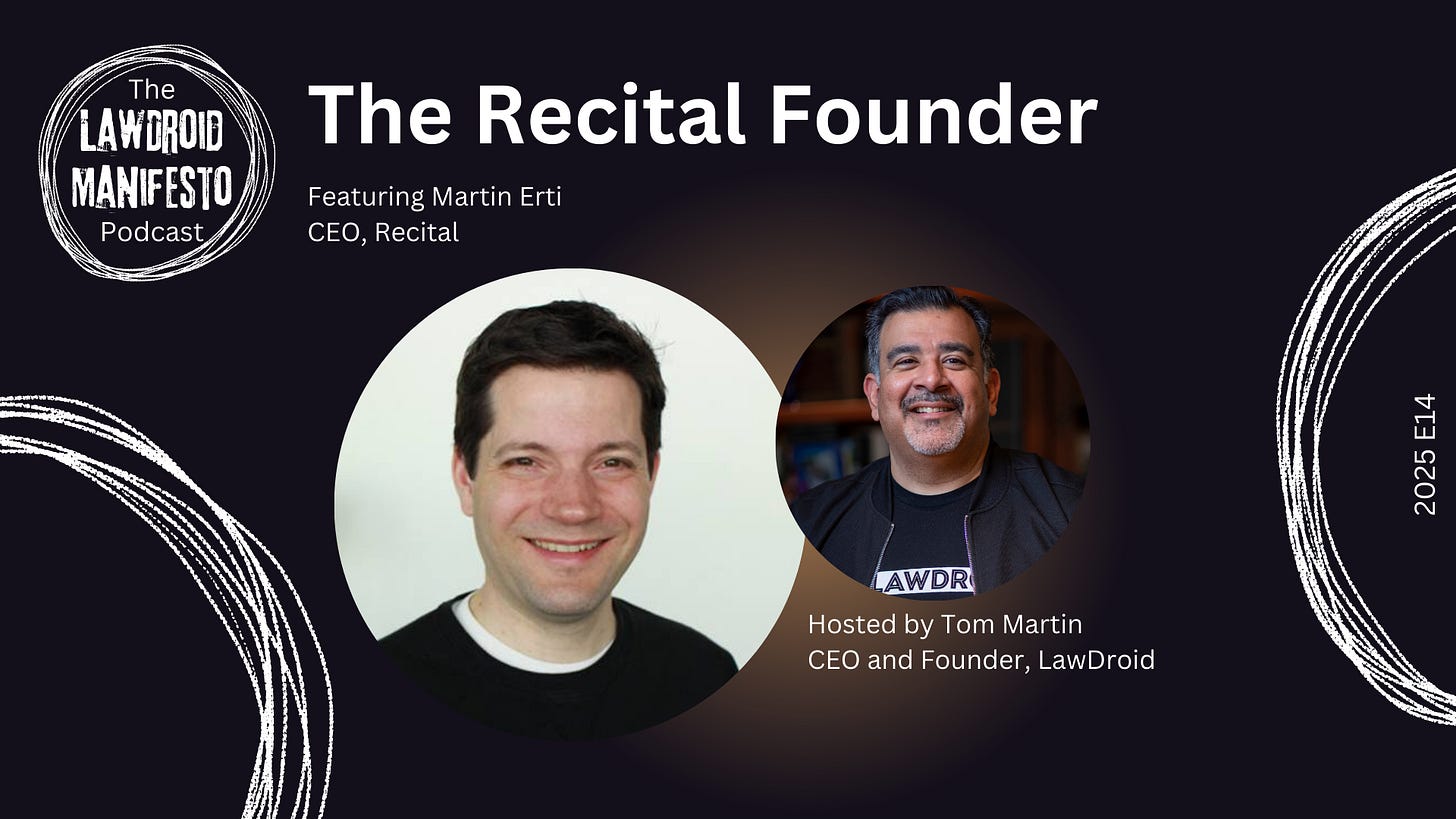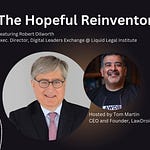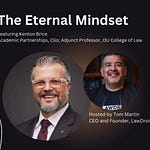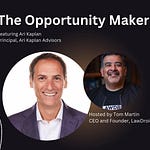Hey there Legal Rebels! 👋 I'm excited to share with you the 14th episode of the 2025 season of the LawDroid Manifesto podcast, where I will be continuing to interview key legal innovators to learn how they do what they do. I think you're going to enjoy this one!
If you want to understand how decades of practical experience in legal technology can lead to breakthrough innovations that respect how lawyers actually work, you need to listen to this episode. Martin is at the forefront of modernizing contract management with AI while respecting existing workflows, and has a unique perspective shaped by his journey from physicist to lawyer to legal tech founder.
From Physics to Legal Tech: Revolutionizing Contract Management
Join me as I interview Martin Ertl, CEO of Recital and a legal tech pioneer with deep roots in the Vancouver technology scene.
In this insightful podcast episode, Martin shares his fascinating journey from studying physics at the University of British Columbia to practicing law and ultimately founding multiple legal tech companies. He reveals how his experience as general counsel at a software company exposed him to the frustrations of contract negotiation via email, inspiring him to create Contractually, an early cloud-based contract management platform that was later acquired by Coupa Software.
Martin explains how lessons from that venture, particularly about lawyers' attachment to familiar tools, informed the creation of Recital, a revolutionary approach to contract management that works with existing workflows rather than disrupting them. His candid discussion covers how Recital uses AI to automatically organize contract repositories in days rather than the months typically required by traditional implementations, all while integrating seamlessly with Microsoft Word, email, and cloud storage.
This episode offers valuable insights for legal professionals and technologists alike, showcasing how understanding lawyers' real needs can lead to more effective innovation. Martin's perspective on building technology that enhances rather than disrupts legal practice makes this a must-watch for anyone interested in the future of legal services.
The Skinny
In this episode, I speak with Martin Ertl, CEO of Recital, about his unconventional path from physics to law to legal tech entrepreneurship. Born in Montreal during the October Crisis of 1970, Martin shares how his early love of science led him to physics at UBC, where his involvement in student government unexpectedly sparked his interest in law. After practicing in a traditional firm, Martin's role as general counsel at Navarik exposed him to the inefficiencies of contract negotiation via email, inspiring him to create Contractually, an early cloud-based contract management system. Following Contractually's acquisition by Coupa Software, Martin founded Recital with a revolutionary approach, creating contract management technology that works with tools lawyers already use rather than forcing them to adopt new platforms. The conversation explores how Recital uses AI to reduce implementation time from months to days, automatically organizing contracts and extracting data while respecting existing workflows.
Key Takeaways:
Traditional Contract Lifecycle Management (CLM) implementations typically require 6-12 months of preparation before organizations can start using the system
Recital can process 5,000 contracts in 1-3 days, automatically detecting signed documents and mapping relationships between master agreements and related documents
One of the biggest barriers to legal tech adoption is forcing lawyers to abandon familiar tools like Microsoft Word and email
Recital's approach focuses on working with existing tools and workflows rather than disrupting them
The system can automatically group different versions of the same contract and create version histories without requiring manual organization
Early exposure to international travel and different cultures can foster an expansive, innovative mindset
The value of optionality and keeping career paths open was a key factor in Martin's decision to attend law school
Effective entrepreneurship requires balancing prioritization with the ability to let go of tasks that don't make the top priorities list
Notable Quotes:
"I'm always been a big believer in the value that lawyers provide. And I still believe that even in the age of AI... I think historically, we haven't, as lawyers, been able to provide as much value as we could. Because there's a lot of work that we do as lawyers that should be done by software by technology." - Martin Ertl (27:51-28:09)
"One takeaway from that whole experience is... when you tried to move lawyers off of Word and email, you're in for a lot of friction and pain as an organization." - Martin Ertl (35:50-35:58)
"One of the unique things about Recital is that it works directly in the tools that in-house counsel already use. So in particular email, whether that's outlook or gmail in particular, Microsoft word and all the common Cloud storage providers." - Martin Ertl (41:16-41:32)
"Recital can actually find different drafts of the same contract and assemble a version history without manual work and without relying on codes in the subject line without having a special email address that you need to use or anything like that." - Martin Ertl (42:33-42:45)
"I like building things, and I mean not necessarily not just in a sense of physical things, but building products, building organizations." - Martin Ertl (22:32-22:36)
"We prioritize and reprioritize, obviously on a weekly basis, not just on a monthly or quarterly basis. Just that's for our stage of company that's important. And even throughout the week we're clear about saying this is the top one or the top 2 things for today and focus on that." - Martin Ertl (59:04-59:18)
"One of the things that's unique about recital is, we avoid as much of that change management as possible, because recital works the way you already work keep using email, keep using word." - Martin Ertl (55:47-55:57)
Clips
How Student Government Cultivates Leadership and Legal Interest
Martin Ertl’s Birth During Quebec’s October Crisis
From Months to Days: The Power of Recital
The Experience of Founding Contractually
Martin Ertl's journey from physicist to lawyer to legal tech entrepreneur illustrates how personal experience with real problems can drive meaningful innovation. His companies have consistently focused on removing friction from contract management processes, with Recital taking a particularly user-friendly approach by working within existing workflows rather than disrupting them. By leveraging AI to automatically organize contracts and extract data, Recital has reduced implementation times from months to days while maintaining the security and confidentiality legal professionals require. Martin's story demonstrates that sometimes the most powerful innovations aren't the ones that force users to change their behavior, but rather those that enhance what professionals are already doing well.
Closing Thoughts
What strikes me most about Martin's approach to legal technology is his respect for lawyers' existing workflows and habits. In an industry obsessed with disruption, he's built solutions that enhance rather than replace the tools attorneys already rely on. This pragmatic philosophy has allowed Recital to solve a critical problem, reducing contract management implementation from months to days, without creating the adoption barriers that sink so many legal tech ventures.
As someone who's been in this space for years, I've seen countless products fail because they asked too much of their users. Martin's journey from physicist to lawyer to entrepreneur has given him a unique perspective on building technology that actually works for legal professionals. His story reminds us that understanding the day-to-day reality of legal practice is just as important as innovative technology when creating solutions that drive real value.
The next time you evaluate legal technology for your organization, consider not just what it can do, but how it fits into your existing processes. The most powerful innovations might be the ones you barely notice using because they work the way you already do.
By the way, did you know you that I now offer a daily AI news update? You get 5 🆕 news items and my take on what it all means, delivered to your inbox, every weekday.
Subscribe to the LawDroid AI Daily News and don’t miss tomorrow’s edition:
LawDroid AI Daily News, is here to keep you up to date on the latest news items and analysis about where AI is going, from a local and global perspective. Please share this edition with your friends and colleagues and remember to tell me what you think in the comments below.
If you’re an existing subscriber, you can learn how to start receiving the daily news by subscribing to this section. I look forward to seeing you on the inside. ;)
Cheers,
Tom Martin
CEO and Founder, LawDroid













